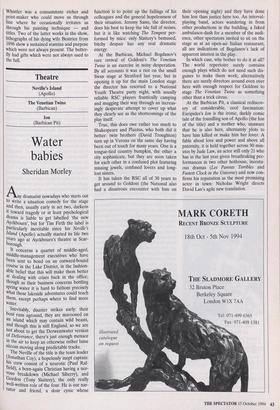Theatre
Neville's Island (Apollo) The Venetian Twins (Barbican) Ion (Barbican Pit)
Water babies
Sheridan Morley
Any dramatist nowadays who starts out to write a situation comedy for the stage and then, usually early in act two, darkens It toward tragedy or at least psychological drama is liable to get labelled 'the new Ayckbourn', but for Tim Firth the label is particularly inevitable since his Neville's Island (Apollo) actually started its life two years ago at Ayckbourn's theatre in Scar- borough.
It concerns a quartet of middle-aged, middle-management executives who have been sent to bond on an outward-bound course in the Lake District, in the fashion- able belief that this will make them better at dealing with crises back in the office; though as their business concerns bottling spring water it is hard to fathom precisely what these lakeside adventures could teach them, except perhaps where to find more water.
Inevitably, disaster strikes early: their boat runs aground, they are marooned on an island which may contain wild beasts, and though this is still England, so we are not about to get the Derwentwater version Of Deliverance, there's just enough menace in the air to keep an otherwise rather lame sitcom moving along predictable tracks. The Neville of the title is the team leader (Jonathan Coy), a hopelessly inept captain: his crew consist of a neurotic (Paul Raf- field), a born-again Christian having a ner- vous breakdown (Michael Siberry), and Gordon (Tony Slattery), the only really well-written role of the four. He is our nar- rator and friend, a dour cynic whose function is to point up the failings of his colleagues and the general hopelessness of their situation. Jeremy Sams, the director, does his best to keep the isle full of noises, but it is like watching The Tempest per- formed by mice: only Slattery's bemused, bitchy despair has any real dramatic energy.
At the Barbican, Michael Bogdanov's rare revival of Goldoni's The Venetian Twins is an exercise in noisy desperation. By all accounts it was a riot on the small Swan stage at Stratford last year, but in opening it up for the main London stage the director has resorted to a National Youth Theatre party night, with usually reliable RSC players frantically camping and mugging their way through an increas- ingly desperate attempt to cover up what they clearly see as the shortcomings of the play itself.
True, this does owe rather too much to Shakespeare and Plautus, who both did it better: twin brothers (David Troughton) turn up in Verona on the same day having been out of touch for many years. One is a tongue-tied country bumpkin, the other a city sophisticate, but they are soon taken for each other in a confused plot featuring missing jewels, confused lovers and long- lost sisters.
It has taken the RSC all of 30 years to get around to Goldoni (the National also had a disastrous encounter with him on their opening night) and they have done him less than justice here too. An interval- playing band, actors wandering in from other productions in the building, a faked ambulance-dash for a member of the audi- ence, other spectators invited to sit on the stage as at an open-air Italian restaurant, all are indications of Bogdanov's lack of apparent interest in the play.
In which case, why bother to do it at all? The world repertoire surely contains enough plays which do not need such dis- guises to make them work; alternatively there are surely directors around even over here with enough respect for Goldoni to stage The Venetian Twins as something other than a trick circus.
At the Barbican Pit, a classical rediscov- ery of considerable, cool fascination: Euripides's Ion is the ironic, darkly comic tale of the foundling son of Apollo (the Ion of the title) and a mother who, unaware that he is also hers, alternately plots to have him killed or make him her lover. A fable about love and power and above all paternity, it is held together across 90 min- utes by Jude Law, an actor still only 21 who has in the last year given breathtaking per- formances in two other hothouse, incestu- ous dramas (Les Parents Terribles and Fastest Clock in the Universe) and now con- firms his reputation as the most promising actor in town: Nicholas Wright directs David Lan's agile new translation.


























































 Previous page
Previous page